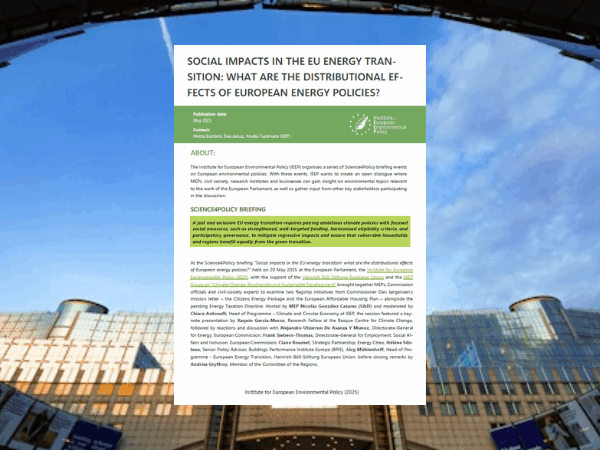AUTHORS: Mattia Bonfanti, Ewa Jarosz, Amalia Tuchmann
A just and inclusive EU energy transition requires pairing ambitious climate policies with focused social measures, such as strengthened, well-targeted funding, harmonised eligibility criteria, and participatory governance, to mitigate regressive impacts and ensure that vulnerable households and regions benefit equally from the green transition.
The Institute for European Environmental Policy (IEEP) organises a series of Science4Policy briefing events on European environmental policies. With these events, IEEP wants to create an open dialogue where MEPs, civil society, research institutes and businesses can gain insight on environmental topics relevant to the work of the European Parliament, as well as gather input from other key stakeholders participating in the discussion.
At the Science4Policy briefing “Social impacts in the EU energy transition: what are the distributional effects of European energy policies?” held on 20 May 2025 at the European Parliament, the Institute for European Environmental Policy (IEEP), with the support of the Heinrich Böll Stiftung European Union and the MEP Group on “Climate Change, Biodiversity and Sustainable Development” brought together MEPs, Commission officials and civil-society experts to examine two flagship initiatives from Commissioner Dan Jørgensen’s mission letter – the Citizens Energy Package and the European Affordable Housing Plan – alongside the pending Energy Taxation Directive. Hosted by MEP Nicolás González Casares (S&D) and moderated by Chiara Antonelli, Head of Programme – Climate and Circular Economy at IEEP, the session featured a keynote presentation by Xaquin García-Muros, Research Fellow at the Basque Centre for Climate Change, followed by reactions and discussion with Alejandro Ulzurrun De Asanza Y Munoz, Directorate-General for Energy, European Commission, Frank Siebern-Thomas, Directorate-General for Employment, Social Affairs and Inclusion, European Commission, Claire Roumet, Strategic Partnership, Energy Cities, Hélène Sibileau, Senior Policy Advisor, Buildings Performance Institute Europe (BPIE), Jörg Mühlenhoff, Head of Programme – European Energy Transition, Heinrich-Böll-Stiftung European Union, before closing remarks by Andries Gryffroy, Member of the Committee of the Regions.
This summary presents the key takeaways from the discussion, addressing the distributional impacts of European energy policies.
The energy transition promises long-term benefits, including environmental protection, economic development, energy independence, and cleaner air. However, without careful design, its implementation risks being regressive. The current distribution of costs places a greater financial burden on lower-income households, for whom electricity and heat represent a larger share of expenditure. Home energy poverty is more likely for rural, female-headed, and elder-headed households. There are also distributional concerns at the member-state level, as Eastern EU countries are more dependent on fossil fuels. Because of these distributional issues, carbon pricing must be paired with compensation mechanisms that consider income levels, geography, and household socioeconomic characteristics such as rurality, gender, and age.
This brief advocates for strengthening and targeting the Social Climate Fund (SCF), reducing minimum tax rates on electricity in the Energy Taxation Directive 2, ensuring effective implementation of the Energy Performance of Buildings Directive (EPBD), and scaling up the use of the Carbon Pricing Incidence Calculator. It also recommends harmonising the definition of vulnerability between the SCF and the EPBD, empowering local governments to implement SCF-funded programs, investing in social infrastructure to strengthen community resilience, and embedding participatory governance mechanisms in the planning of climate policies.
There is another Science4Policy briefing, on the subject “Ensuring affordable energy and a competitive European industry with the Clean Industrial Deal” on 4 June. The link to the agenda can be found here, and the link to the registration form can be found here.

